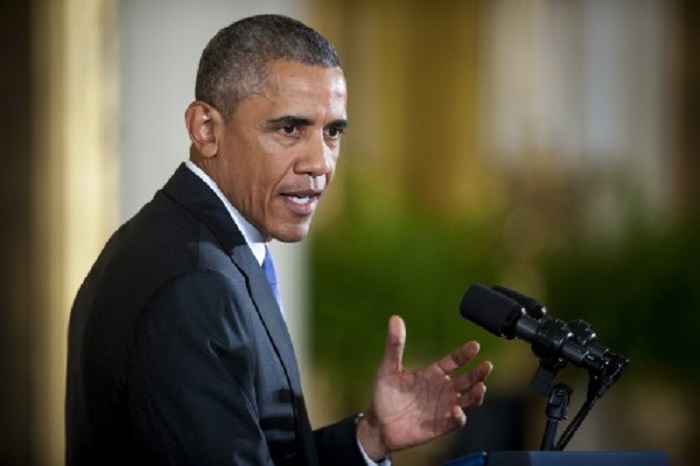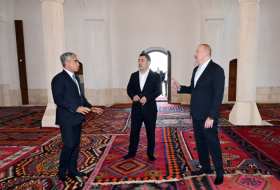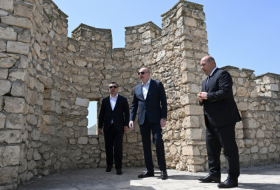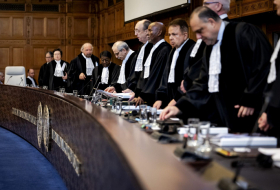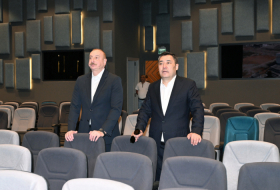Defense experts said giving more fighters on the ground access to U.S. close air support could shift the momentum in Syria. But a senior member of the Saudi royal family who asked not to be identified dismissed the decision as "window dressing."
In announcing the deployment, Obama emphasized the importance of sustaining the gains made in the fight against Islamic State, although he cautioned that the U.S. forces would not be spearheading the battle.
"They`re not going to be leading the fight on the ground, but they will be essential in providing the training and assisting local forces as they continue to drive ISIL back," he said in a speech in the German city of Hanover, using an acronym for Islamic State.
Obama was speaking on the last stop of a foreign tour that also took him to Saudi Arabia and Britain.
Democratic presidential front-runner Hillary Clinton and her rival, Bernie Sanders, voiced support on Monday for the deployment.
"These Special Forces will continue to provide critical support to local forces on the ground who ultimately must be the ones to win this fight," Clinton`s campaign said in a statement. The former secretary of state previously called for a tougher approach to fighting Islamic State militants, including more air strikes and Special Forces.
Sanders, a U.S. senator from Vermont, said during an MSNBC town hall: “I think what the president is talking about is having American troops training Muslim troops, helping to supply the military equipment they need, and I do support that effort."
The U.S. military has led an air campaign against Islamic State since 2014 in Iraq and Syria, but its effectiveness in Syria has been limited by a lack of allies on the ground in a country where a multi-sided civil war has raged for five years.
A Russian air campaign launched in Syria last year has been more effective because it is closely coordinated with the government of President Bashar al-Assad, who is Moscow`s ally but a foe of the United States.
Rising tensions with Saudi Arabia and other Gulf Arab monarchies, which have privately criticized the Obama administration`s security policy toward the region, also have complicated the U.S. effort in Syria.
U.S. Republican Senator John McCain called the move overdue but insufficient. "Another reluctant step down the dangerous road of gradual escalation will not undo the damage in Syria to which this administration has borne passive witness," said McCain, who leads the Senate Armed Services Committee.
Republican presidential front-runner Donald Trump did not mention the deployment during a campaign rally in Rhode Island. He plans to address foreign policy in a speech on Wednesday in Washington.
CLOSE AIR SUPPORT
Washington`s main allies on the ground have been a Kurdish force known as the YPG, which wrested control of much of the Turkish-Syrian border from Islamic State. But the alliance has been constrained because U.S. ally Turkey is deeply hostile to the YPG.
"Presumably these (extra U.S. forces) are going to assist our Kurdish YPG friends to widen and deepen their offensive against IS in northeastern Syria,” said Tim Ripley, defense analyst and writer for IHS Jane`s Defense Weekly magazine.
The deployment will include medical and logistics support personnel, officials said, and U.S. support for the American forces in Syria will be staged out of northern Iraq.
Their goal will be to help screen and equip Arab fighters seeking to join up with the majority Kurdish Syrian Democratic Forces. U.S. officials say Arab fighters will be crucial to future operations against Islamic State in traditionally Arab parts of Syria.
But Washington would still have to take a political decision to help the Kurds despite Turkish objections. Kurdish advances have largely stopped since February, with Turkey opposed to the Kurds taking more territory.
The Syrian Democratic Forces, a U.S.-backed coalition set up in October to unite the Kurdish YPG and some Arab allies, welcomed Obama`s announcement but said it still wanted more help.
"Any support they offer is positive but we hope there will be greater support," SDF spokesman Talal Silo said. "So far we have been supplied only with ammunition, and we were hoping to be supplied with military hardware."
The HNC umbrella opposition, which represents groups opposed to Assad but not the Kurds, also welcomed U.S. forces helping rid Syria of the Islamic State "scourge", but said Washington should do more to fight Assad.
If the Kurds are given the green light to advance with American air support, the main short-term objective could be sealing off the last stretch of the border that is not held by the Kurds or the government, west of the Euphrates river.
That would deny Islamic State access to the outside world, but would infuriate Turkey, which regards the border as the main access route for other Sunni Muslim rebel groups it supports against Assad, and for aid to civilians in rebel areas.
THE RACE FOR RAQQA
U.S. Special Forces teams providing close air support could ultimately help the Kurds advance on Raqqa, Islamic State`s main Syrian stronghold and de facto capital.
With German Chancellor Angela Merkel sitting in the audience in Hanover, Obama also urged Europe and NATO allies to do more in the fight against Islamic State. The group controls Mosul in Iraq in addition to Raqqa and a swathe of territory in between, and has proven a potent threat abroad, claiming responsibility for major attacks in Paris in November and Brussels in March.
"Even as European countries make important contributions against ISIL, Europe, including NATO, can still do more," Obama said.
European countries have mostly contributed only small numbers of aircraft to the U.S.-led mission.
Obama pledged to wind down wars in the Middle East when he was first elected in 2008. But in the latter part of his presidency he has found it necessary to keep troops in Afghanistan, return them to Iraq and send them to Syria, where at least 250,000 people have been killed in the civil war.
In Iraq, Islamic State has been forced back since December when it lost Ramadi, capital of the western province of Anbar. In Syria, jihadist fighters have been pushed from the city of Palmyra by Russian-backed Syrian government forces.
TALKS IN MELTDOWN, TRUCE IN TATTERS
But Washington`s lack of allies on the ground has meant its role in Syria has been circumscribed. The entry of Moscow into the conflict last year tipped the balance of power in favor of Assad against a range of rebel groups supported by Turkey, other Arab states and the West, including the United States.
Washington and Moscow have sponsored a ceasefire between most of the main warring parties since February, which allowed the first peace talks involving Assad`s government and many of his foes to begin last month.
Those talks appear close to collapse, with the main opposition delegation having suspended its participation last week, and the ceasefire is largely in tatters. Islamic State is excluded from the ceasefire.
Obama, Merkel and the leaders of Italy, Britain and France on Monday called on the parties in the Syrian war to respect the agreement to cease hostilities and make peace talks work, the White House said in a statement after the Western leaders met.
More about:








